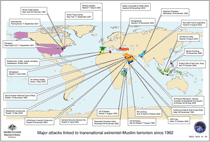 |
 |
 |
 |
|
Major attacks linked to transnational extremist-Muslim terrorism since 1992 |
|
The back-to-back terrorist bombings in London and Egypt last month were major strikes against America's allies in
the "War on Terror." However, many counterterrorism experts both in Europe and the Middle East are doubtful that
the two attacks were coordinated, or even perpetrated by the same group. Although al-Qa'ida's training camps and
infrastructure in Afghanistan have been destroyed, with many of its leaders either captured or killed, the militant
brand of Islam disseminated by Osama Bin Laden and the collective anger generated by the war in Iraq are galvanizing
local radical Muslim organizations to lash out at Western targets. Tragically for Britain, just as the IRA renounced
violence after more than 30 years of armed struggle, the country faces another terrorist foe of a different ideological stripe.
Similarly, Egypt has been contending with organized political violence for many years now, beginning with the assassination
of President Anwar Sadat by a member of the Islamic Jihad group in 1981. But the magnitude of the attack on Sharm al-Sheikh,
an Egyptian resort popular with Western and Israeli tourists, was particularly shocking. The war in Iraq, ostensibly
being fought to make the world safe from terrorism, is not going as planned. The country has become a virtual breeding
ground for terrorists, as evidenced by the almost daily suicide attacks being carried out against the occupation armies
and the police forces they are trying to establish. Many challenges lie ahead for both the Western powers and Middle
Easterners as they try to confront and defeat a shadowy enemy that poses a credible threat to the international order.
In fighting terrorism, America and Europe must be careful not to alienate their own Muslim communities, and to take
precautions against possible anti-Muslim backlashes. For their part, Muslim leaders will have to unequivocally and
publicly denounce all acts of terrorism. The fatwas issued by several influential imams condemning the London attacks
were a step in the right direction.
From CIAO's database:
The "War" on Terrorism: A Cultural Perspective
Combating Terrorism and Its Implications for the Security Sector
Radical Islam in Egypt: A Comparison of Two Groups
The Islamic Fundamentalist View of Life as a Perennial Battle
The Economics of Terrorism
Responding to Terrorism: What Role for the United Nations?
Outside Links*:
U.S. Department of State: Counterterrorism Office
http://www.state.gov/s/ct/
Centre for the Study of Terrorism and Political Violence at the University of St. Andrews
http://www.st-andrews.ac.uk/academic/intrel/research/cstpv/
The Council on American-Islamic Relations
http://www.cair-net.org/
UN Action Against Terrorism
http://www.un.org/terrorism/
EUROPOL: Counter Terrorism Unit
http://www.europol.eu.int/index.asp?page=publ_terrorism&language=
Rand Corporation: Terrorism and Homeland Security Research Area
http://www.rand.org/research_areas/terrorism/
What Do We Know About Militant Muslims?
http://www.eicds.org/english/publications/saadarticles/2004/whatdoweknow.htm
* Outside links are not maintained. For broken outside links, CIAO recommends the Way Back Machine [http://www.archive.org/].
|
 |